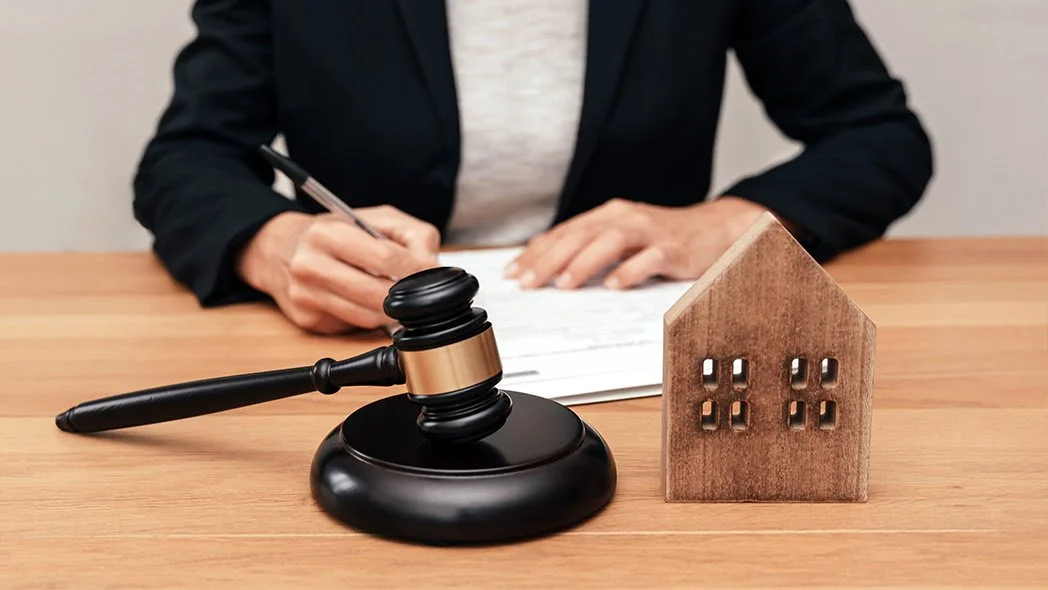[Guide] How to Appeal an Atlanta Property Tax Increase
Property tax hikes can catch Atlanta homeowners by surprise and put unexpected pressure on your household budget. You probably get that sinking feeling in your stomach when you open that county envelope and see an 18 percent increase in your home's value - but Georgia provides a built-in safety valve for you to use. With a few evenings spent collecting evidence, you can push back against that assessment.
Your timeline starts running when Fulton or DeKalb sends your assessment letter. Those 45 days can disappear very quickly, considering the mail delivery time plus the days you need to collect sales data, take photos, and fill out application papers. The shrinking timeline explains why lots of homeowners just sigh, write the bigger check, and hope for better luck next year.
The appeal process becomes more straightforward when you first verify your property's assessed value. You should look up recent sales for houses like yours in square footage, age, and neighborhood character. You can check the county website and free real estate websites for this information. Take a few photos showing any problems - like an aging roof, a difficult driveway, or that furnace you had to replace last winter. These small elements help create evidence that shows reviewers your property isn't quite as perfect as their computer formula suggests.
After you've prepared your information, you can file your appeal online or in person.
Let's talk about this together!
When Should You Challenge Your Assessment Notice?
When you appeal your property tax, your timing determines if your case will even be considered. Georgia gives you only 45 days from the date on your assessment letter, and your countdown begins when it arrives in your mailbox. If you miss this deadline, your appeal is automatically rejected - no extensions, no grace period.
In most counties, you'll receive your 2026 assessment letters in late April or early May, with deadlines usually falling in mid-June. Be aware of this timing. But don't count on it completely. Each county follows its own schedule, and even a difference of a few days can take away your opportunity to appeal if you wait too long. A simple way to protect yourself is to mark the date you receive your letter, then plan to file at least a week before the deadline. The extra time protects you from delayed mail, unexpected trips, or frustrating website crashes that seem to happen right when you need to submit your appeal.
Since these deadlines change from county to county, you should check yours directly with your county assessor, whether you're in Fulton, DeKalb, Gwinnett, Cobb, or anywhere else in Georgia. Their websites usually show the deadline prominently. If you can't find this information quickly, take a minute to call or send an email instead of guessing. Spending a minute on hold now is much better than discovering you've missed your chance when it's already too late.
If you're concerned about possible complications, take some time to review Georgia Code §48-5-311. The statute contains the procedural rules, including information about the strict timeline. Most property owners find that reading the law resolves any confusion - everything is spelled out plainly, and you can reference it if a county employee gives you information that doesn't match up with the official laws.
Before you start a formal appeal process, try a quick talk with someone at the assessor's office. Ask them to explain how they calculated your property value and if obvious mistakes - like incorrect square footage, wrong construction date, or missed exemptions - can be corrected immediately. Most disagreements disappear once the information is updated correctly, and you save everyone the hassle of processing unnecessary paperwork.
If you determine that a full appeal is necessary, choose just one primary reason - like overvaluation or unequal assessment compared to similar properties, questions about taxability, or denial of exemptions - and support it with solid evidence. These might include recent comparable sales, professional appraisal reports, photographs, or anything else that strongly makes your case. When you submit a well-documented appeal, it demonstrates you've done your homework and usually results in a faster review process.
The Best Evidence
Your appeal needs to turn the random numbers into a story the board can easily check and understand. You'll want to look up recent sales in your neighborhood by checking county property records, MLS data, or searching through Fulton or DeKalb's online portals. Take some time to narrow down your search by filtering for year built, square footage, and lot size until you have just a few homes that compare to yours. These comparable properties help you determine your home's real market value.
Next, add some expert backing to your case. A licensed appraiser will probably charge a few hundred dollars for their services. Their professional assessment carries real weight - usually much more than your personal statements would. If you think the price tag seems high, consider how it compares to what you'll save with lower taxes over the next year or two.
Once you've gathered comparable sales and an appraisal, you need to show why your property should be assessed below similar homes. Take effective photos of any structural problems - like that cracked slab, water-stained ceiling, or leaning fence on your property. Make sure to connect each photo with at least one contractor's estimate for repairs or, better yet, two estimates if possible. The assessment board won't pay much attention to general complaints about your property's condition. But they'll notice when you show them a $19,800 roof repair estimate alongside pictures of your missing shingles.
The timing of your appeal is as important as what you include in it. House Bill 92 has shortened the appeal window to just 45 days from when your assessment letter was postmarked. That means most Atlanta homeowners need to submit everything by mid-June. You'll want to mark this deadline on your calendar immediately - because once that submission portal closes, not even the best evidence will help your case.
Your final step is to put together all your materials as professionally as you would for a big work presentation. Take time to scan all receipts and estimates, give each file a descriptive name, and save everything in a cloud folder and on a backup thumb drive. This preparation pays off when your hearing date comes - you can just open your folder, show the appraisal, display the photos, and present the repair quotes without any panicked paper-shuffling or missing documents. When the board sees how professionally you've put everything together, it can lead them to rule in your favor, especially in cases where it's a close call.
When you combine reliable data, professional opinions, obvious evidence of property problems, and well-done organization, you create a strong case. The board will find it hard to deny your appeal when these elements come together to support the property value you're suggesting.
Your Appeal Form
Filing your appeal online is usually quite simple. You just need to upload your documents as PDFs, click the submit button, and you'll get a confirmation email almost immediately. One handy aspect is that if you see a mistake, you can usually sign back in later that same day to correct it. But there's a downside. The website tends to get overwhelmed with traffic during the final week before deadlines, and this creates frustrating timeouts that might erase your work. To avoid this issue, have all your documents well-scanned and named before you even start the online process.
Mailing your appeal is a practical option if you like having physical proof of your submission. Using certified mail or a delivery service with tracking gives you that important postmark date and lets you follow your package as it moves through the postal system. You should plan ahead, though. What normally takes two days could stretch to five if there's a holiday weekend or if the sorting centers are backed up with extra volume.
Walking into the county office with your appeal packet might look old-fashioned, yet it comes with benefits that online methods can't provide. A staff member will review your forms right there while you wait, point out if you've forgotten a signature, and give you a stamped receipt that proves just when you filed. Just remember to verify the office hours before you head over - budget reductions and unexpected closures have left lots of taxpayers standing in an empty lobby, confused about what happened.
The deadline controls everything about your appeal - you need to file within 45 days after the assessment letter arrives in your mailbox. Consider setting up a reminder for yourself right when you receive that letter. Try to submit your appeal at least two weeks before the deadline to avoid the yearly rush that overwhelms computer systems and creates unnecessary stress for everyone involved.
Before you submit anything, take time to read through the forms out loud to yourself. Reading out loud helps you catch mistakes like parcel numbers, forgotten signatures, and supporting documents that might otherwise go unnoticed. Your appeal process can move forward while your neighbors are still looking for their paperwork.
What Happens After You File?
If the adjustment still seems wrong, your countdown begins. Thirty days. That's how long the law gives you to say, "I disagree." Within that window, you can take your case to a hearing officer or move directly to the Board of Equalization. These two options come with trade-offs - the hearing officer usually works faster. But the board gives you a more thorough review. One relies heavily on evidence packets; the other lets you give live testimony. You need to decide based on what you can actually prove, how much time you have available, and which setting makes you feel more comfortable. Remember that the next step is your choice, not something the county controls.
Different counties follow the same basic principles but interpret them in their own ways, so the procedure you see in Fulton might look completely different when you get mail from DeKalb. Small differences - a form that asks for property information in an unexpected place, a deadline hidden in small print - aren't mistakes, just local ways of doing things. When you see these differences early, you stay ahead in the process.
This brings us to staying organized. Make a single folder, either on your computer or as a physical file, and put every letter, spreadsheet, and photo inside it. Set up two calendar reminders for each main date you find - one a week before and another the day before. Those quiet periods between communications can trick you into thinking nothing is happening. More appeals fail because people miss follow-ups than because they have weak evidence. When you start feeling worried, check the county's status page to confirm your file is still moving forward. A quick check lets you sleep better at night - and sometimes shows problems while you still have time to fix them.
Other Options
Use that quiet period to test the low-pressure option first - talk to the assessor's staff. A five-minute phone call or a quick visit usually shows mistakes in square footage, depreciation, or comparable sales that fell through their formula. You'll probably walk away with a small adjustment immediately or at least a clearer picture of how strongly the county stands behind its number.
When your first conversation raises red flags or the dollars at stake make your stomach flip, you should change direction and price out professional help. Attorneys and tax consultants charge either a flat retainer or a percentage of whatever they save you. But they also bring market data, practical expertise, and someone who can stand behind the lectern while you continue running your business. For more complex parcels - think mixed-use buildings, large acreage, or anything worth millions - those skills usually pay for themselves.
Not every rise in value deserves a full battle. When the increase seems minor, waiting for the next assessment cycle makes more sense now that HB 581 lets successful appellants "freeze" the value they win. You can time your challenge for a year when the difference between your view and the county's is wide, then lock it in for predictable bills down the road. Taking a strategic pause can work as a deliberate tactic instead of mere delay.
You should look at your options - going solo, hiring a professional, or waiting until next season - by running the math before reaching for your wallet. When you spend $500 to chase $200 in savings, you're pursuing a hobby, not a strategy. Flip those numbers around, and professional advice turns into a worthwhile investment.
Filing correctly matters just as much as your argument. But the process slows down during the last-day rush. You can file during a quiet morning, save a screenshot of the confirmation, and you'll never need to argue that a frozen website made you miss the deadline. Setting a reminder on your calendar beats a late-night scramble every time.
Moving to Atlanta?
One minute, you're sipping coffee; the next, you realize that the county thinks your bungalow rivals a Buckhead estate. Take a breath. Thousands have challenged inflated numbers and won - and you can, too, if you act fast.
The calendar starts ticking the day the assessment letter lands in your mailbox. Forty-five days isn't much time. But it's enough when you break the job into smaller tasks. Mark the deadline on your phone, then spend an evening pulling recent sales that match your home. Another night, scan repair receipts or snap photos that show the wear a paper report can't capture. You'll see that when you finally download the appeal form, most of the work is already done.
When you file late, you lock in the county's value for an entire year, which means you'll write twelve bigger checks than necessary. File on time, and the balance of power flips - the assessor needs to justify their number, not you. The updated guidelines that rolled out earlier this year make that exchange even fairer by requiring clearer explanations and giving you online tracking. You can watch your case move from "received" to "reviewed" without sitting on hold.
The process isn't glamorous - hardly anyone frames copies of an appeal packet - but it puts money directly back in your pocket. Homeowners who see even a modest ten-percent reduction usually save enough to cover a month of mortgage payments. That's real money for back-to-school supplies, a weekend trip, or the emergency fund that never seems to grow on its own.
If paperwork feels uncomfortable to you, try out the tools already created with homeowners in mind. Fulton and DeKalb counties host searchable sales databases and easy-to-follow instructions - neighborhood Facebook groups trade pointers on which comps persuaded reviewers last season. Every resource you read or neighbor you text gives you more certainty. You can turn a tough chore into a set of familiar tasks.
After everything settles down, you'll open a revised bill that finally shows what your home is actually worth - proof that a few focused afternoons can save real money and support Atlanta's story of fairness.
If lowering your bill is only the first step - trading suburbs for skyline views or vice versa - reach out to the Justin Landis Group. We live in these neighborhoods every day and are here to help you find the next address that feels as right as your tax bill now does. Contact us today!







